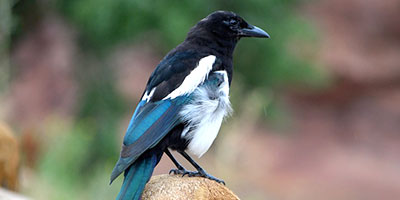 Major rural organisations have joined forces to warn Natural Resources Wales (NRW) of the catastrophic consequences that a proposed change to the general licence could have on wild birds.
Major rural organisations have joined forces to warn Natural Resources Wales (NRW) of the catastrophic consequences that a proposed change to the general licence could have on wild birds.
General licences are issued in Wales by NRW under the Wildlife and Countryside Act 1981. General Licence 004 permits the killing or taking of certain birds, such as carrion crows and magpies, for the purpose of conserving other wild birds. However, under new proposals, the licence will only apply for “conserving red or amber listed birds of conservation concern”, meaning that all other wild birds could be exposed to new and significant predation.
The British Association for Shooting and Conservation, Countryside Alliance National Gamekeepers’ Organisation, the Game and Wildlife Conservation Trust, the Farmers Union of Wales, NFU Cymru and the Country Land and Business Association have been working closely with NRW on changes to the general licences and have issued this warning to NRW staff on several occasions.
NRW claims that its proposed changes to the general licences are underpinned by evidence. However, there is no proven necessity or evidence which justifies this particular change. Equally, there is no legal precedent in any other European country. The proposed change would see the licence for wild bird conservation in Wales look very different from the equivalent conservation licences in England and Scotland.
Steve Griffiths, BASC Wales Director, said: “It is not too extreme to say implementing this proposal would have catastrophic consequences. The changes would present a very real threat to many of the most treasured bird species in Wales by leaving them without uniform protection. It would change for the worse the Welsh countryside as we know it.”
Rachel Evans Countryside Alliance Director for Wales said: “NRW are dangerously venturing into the unknown. The changes present a very real threat to many of Wales’ most treasured bird species, which will now be without uniform protection. NRW’s claim that the general licences will be monitored and reviewed shows a lack of understanding of conservation: it is easier to preserve current populations than to reverse decline.”
Dafydd Jarrett NFU Cymru Policy Adviser said: “Many farmers in Wales participate in agri-environment schemes with specific prescriptions to encourage conservation of certain bird species. The inability to control damaging bird species such as carrion crow and magpies under General Licence 004 when necessary, can put the achievement of this objective in jeopardy.”
GWCT’s Sue Evans said “We are concerned about the way the evidence review process has been conducted. Particularly that the scientific evidence review process and conclusions drawn from it are being made by one person rather than a team of experts with a range of views/perspectives and as such evidence seems to have been missed. For example, the research highlighting the benefit of predation control for songbirds which would not be afforded protection under the proposed new licence and 51% of our members who listed the impact of predation on songbirds as their motivation for use of general licences.”
The National Gamekeepers Organisation said, “For decades our members have legally controlled common predatory birds under general licence in order to help all wild birds, not just pheasants and partridges. The benefits are scientifically proven and it’s a service provided by gamekeepers at no cost to the taxpayer. It would be crazy for NRW to stop this essential contribution to conservation in Wales.”
The FUW support the concerns of stakeholders raised above and that the new proposed general licences available to land managers should seek to maintain the status quo so that rural businesses, flora and fauna are protected for future generations.
The CLA said: “The well-established general licence exists to ensure that rural businesses are able to protect livestock, crops and other business interests from predation or damage. Promoting and delivering bio-conservation is a benefit which farmers and landowners will appropriately be rewarded. Part of this valuable work is the control of pests which harm many of society’s most valued species.”
